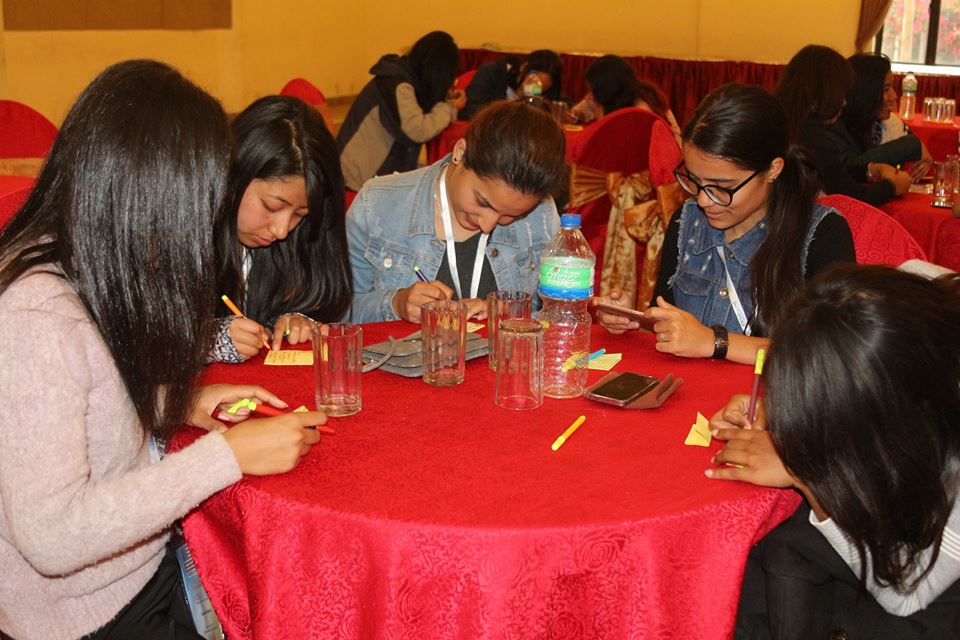
Building new startups, and winning. Photo credit: Techcamp Nepal.
Nepal. The tiny country is best known to the world as the home of Mount Everest, the stuff of many trekking inspirations, and for being the only Hindu nation in the world.
But romanticized lores aside, placed between two giant economic powers – China and India – Nepalis have long lived a life of poor economic growth, political instability, and stalled development.
The Himalayan country only recently got a Constitution, and is just beginning to emerge from the effects of being cut off from the rest of the world for a very long time. With these changes have come the modern entrepreneurial drive, and the understanding of tech as a tool to take the country to the future.
See: In the shadow of Everest, a Startup Valley begins to emerge
Not surprisingly for a developing country, the gender wage gap in the country is in the bottom half of the world rankings – Nepal ranks 110th of 144 countries surveyed by the United Nations. Long-standing traditions, conservatism, and a general lack of amenities are to blame, locals say. But ask the Nepali women of today, and it’s easy to see how they’ve decided to take these challenges, and, in true entrepreneurial spirit, plan to turn them into opportunities.
Tech is their tool.
A tech camp for women

Girl power. Photo credit: Techcamp Nepal.
Last week, the Ellaine Memorial Foundation, in partnership with the Microsoft Innovation Center Nepal and the US Embassy in Kathmandu, got together feisty entrepreneurs to a tech camp for women – the first such drive in the country.
About 300 women applied for a spot at the camp, 51 of whom got in after a grueling five-day bootcamp.
There were startup ideas ranging from everything to apps that aim to promote a more open government, to building new-age smoke detector systems, to mobile wallets, to selling homemade goods online.
“Our problem is a lack of resources and mentorship. We don’t get mentors at the right time for the right things,” said Melisha Ghimire, an attendee and the founder of Echo Innovators, which makes solutions for web and mobile designs and development.
That problem was solved to some extent as Microsoft gathered mentors from countries all around the world – Indonesia, India, Pakistan, Singapore, Kyrgyzstan, Kazakhstan, and more.
Despite sharing boundaries with China and India – two of the biggest tech hubs in the world – Nepal’s technology scene is only just being built. This presents a window for enthusiasts that join in the first wave of innovation. Google Maps doesn’t work well, and apps for everything – the kind we are used to in India – are not commonplace. Online payments aren’t trusted widely, and there is yet to be a seamless mobile wallet that can digitize payments.
Which means there is space to build the first successful mobile wallet, the first very big ecommerce company, and the first hardware startup – which is what Microsoft’s “student partners,” as the entrepreneurs are called, are doing.
Budding entrepreneurs

The winners of a pitching contest. Photo credit: Techcamp Nepal.
Take Shirisha Maharjan for example. Shirisha, along with Jenisha Thapa and Shreeya Karmacharya, built a prototype for a smoke alarm that hooks up to a CCTV and which can be monitored by an app. Building a hardware startup is tough in any part of the world, and is harder still in Nepal. But the idea is innovative for the country, and the team has turned their homes into labs to build the gadget.
There are others who have gone the same way. Eeda Rijal, the founder of Sochware, is building a piece of hardware that determines the level of moisture in the soil to help farmers, and has already found her first client – a mushroom farmer.
“We are taking our product to Imagine Cup, where we will be able to take the next steps towards commercialization,” Shirisha says.
Other winning ideas include a digital mobile service – Flash Pay – important and scalable in a country where people still stand in line for hours to pay their utility bills, and an app to “Bounce Back” from mental health issues like depression – yet another stigmatized area in the country.
The Microsoft Innovation Centre says it plans to use its Impact Fund – which helps develop local startups – to build on these ideas.
“Innovative solutions are being built to solve Nepal’s biggest problems using the power of the youth and women, and to ensure that we have sustainable development using these technological innovations,” Allen Bailochan Tuladhar, the regional director for Microsoft in these parts, said.
“For Microsoft, the hope is to ensure that […] using the power of the cloud and mobile, [Microsoft] would be able to help create solutions for the local software economy.”
This post In the home of Everest, 51 tech girls take their country to the future appeared first on Tech in Asia.